Listen:
Check out all episodes on the My Favorite Mistake main page.
My guest for Episode #57 is Art Bell, the creator of The Comedy Channel (which later became Comedy Central). He's also the author of the book Constant Comedy: How I Started Comedy Central and Lost My Sense of Humor, and co-host of the podcast “Constant Comedy.”
Today, we talk about Art's “favorite mistake” (it involves the comedian and talk show host Bill Maher) and topics and questions including:
- The ad campaign for “Politically Incorrect with Bill Maher” and how that ended up leading to an award
- Why it's bad to surprise the talent
- Did Al Franken walk out on “State of the Union: Undressed” because he didn’t know it was going to be live??
- Was that show a better fit, the next year, for Dennis Miller?
- Having to often talk Nancy Grace into going on the air on Court TV
- Is it risky to write a memoir like this? Did you need lawyers involved to make sure you weren’t making a mistake?
- Jon Stewart – on “Short Attention Span Theater, was it a mistake to fire his co host Patty Rosborough without taking to him? – telling or asking? He was surprised…
- Mistake for them to not make him the original host of The Daily Show?
- Mistake for Michael Fuchs to say the programming quality was a 2 or 3 out of 10?
- You decided quickly it was a mistake to say you were quitting?
- New York mag called the channel “the biggest flop in years”
- Making adjustments?? PIVOTED and made changes as quickly as we could
- Getting fired from Comedy Central and lessons learned
You can listen to or watch the episode below. A transcript also follows lower on this page. Please subscribe, rate, and review via Apple Podcasts or Podchaser! You can now sign up to get new episodes via email, to make sure you don't miss an episode. This podcast is part of the Lean Communicators network.
Watch the Full Episode:
Quotes:
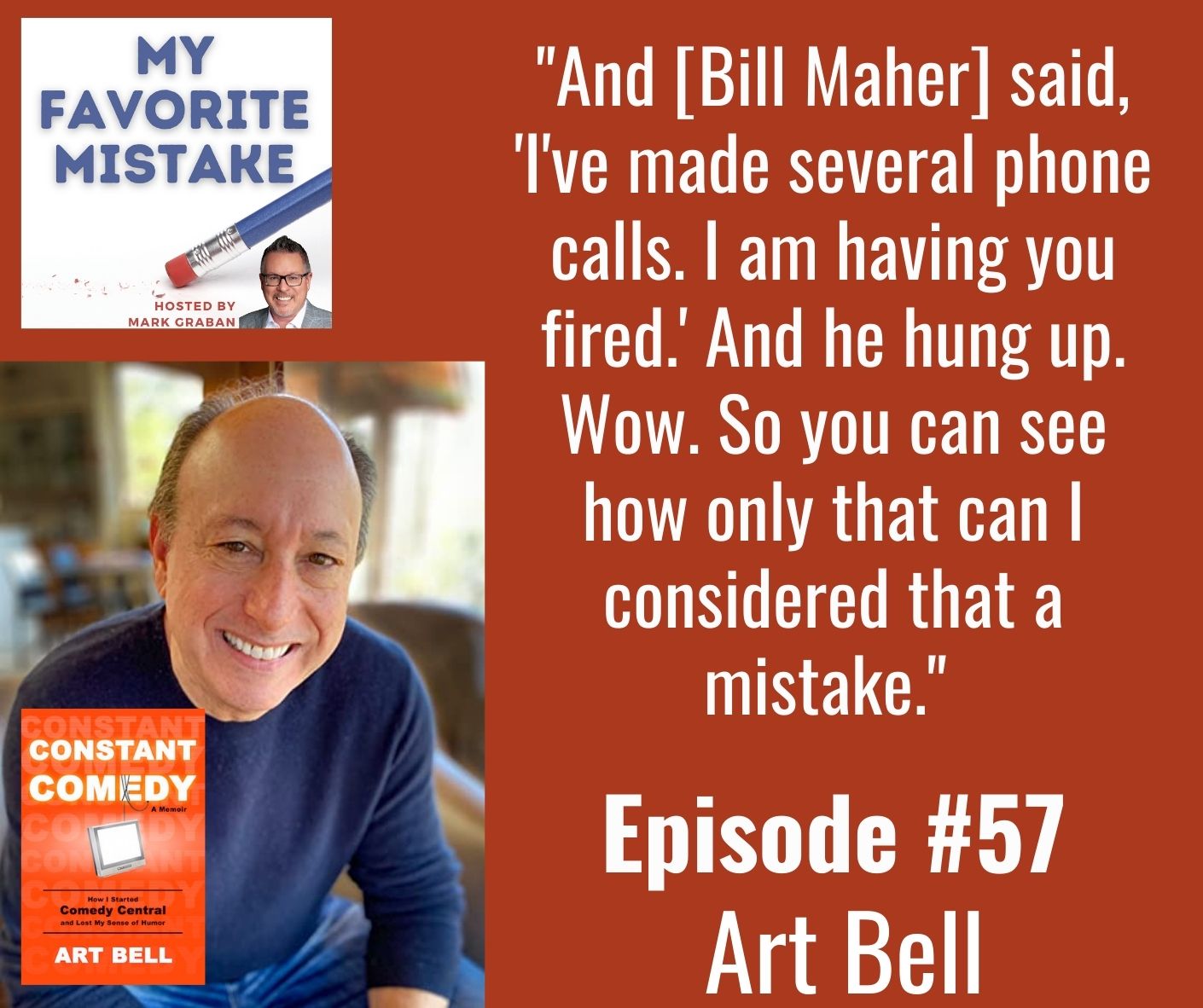
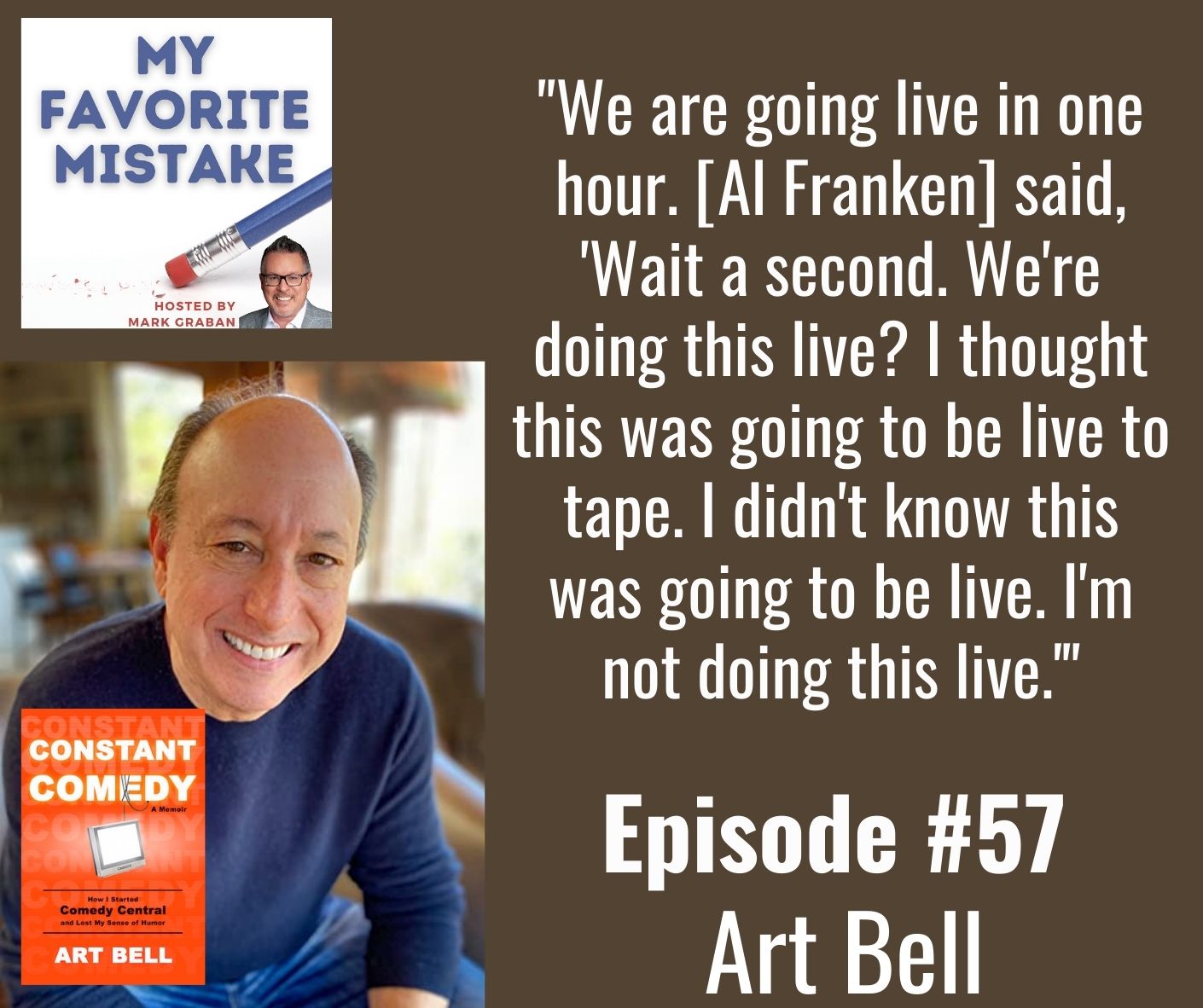
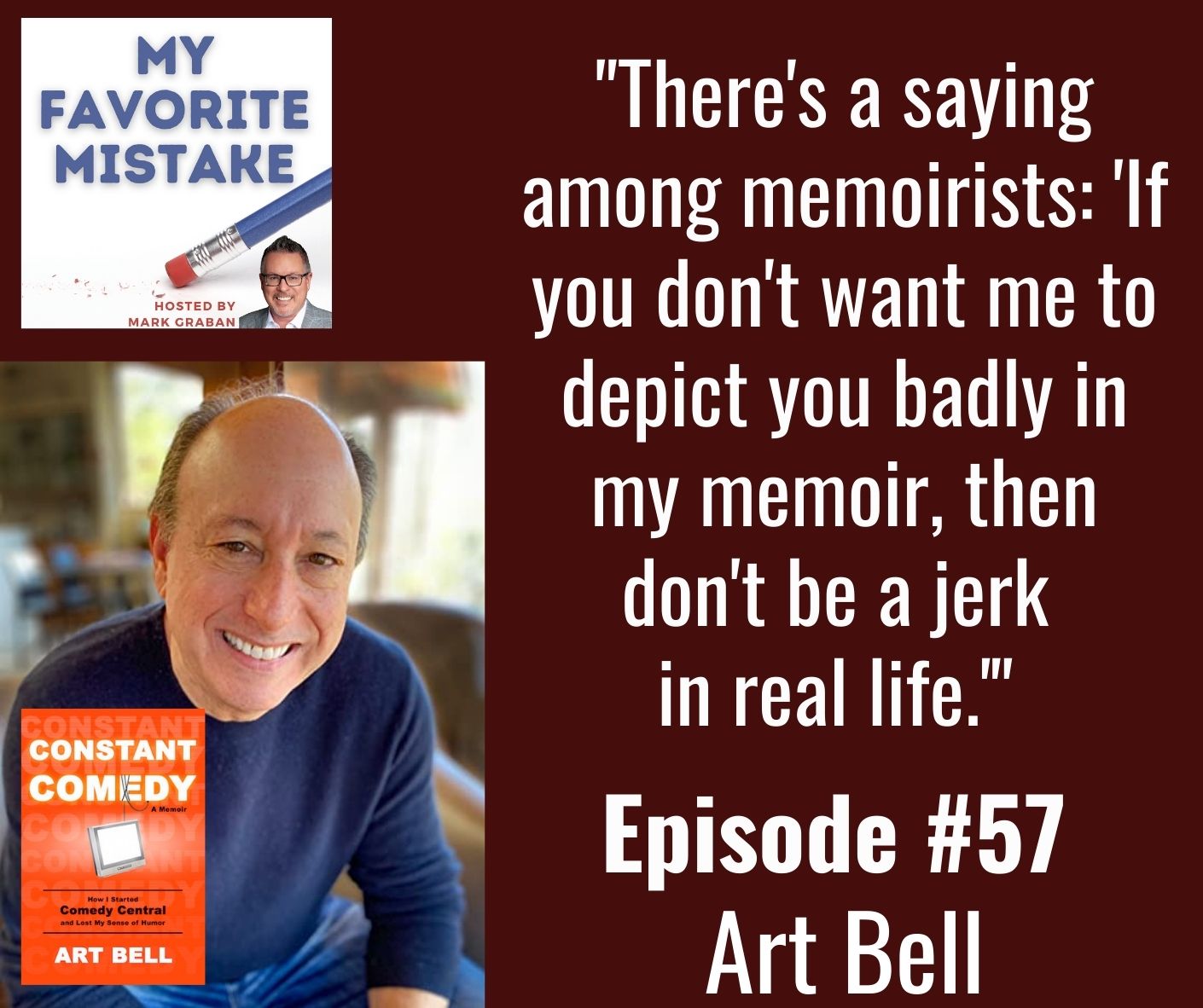
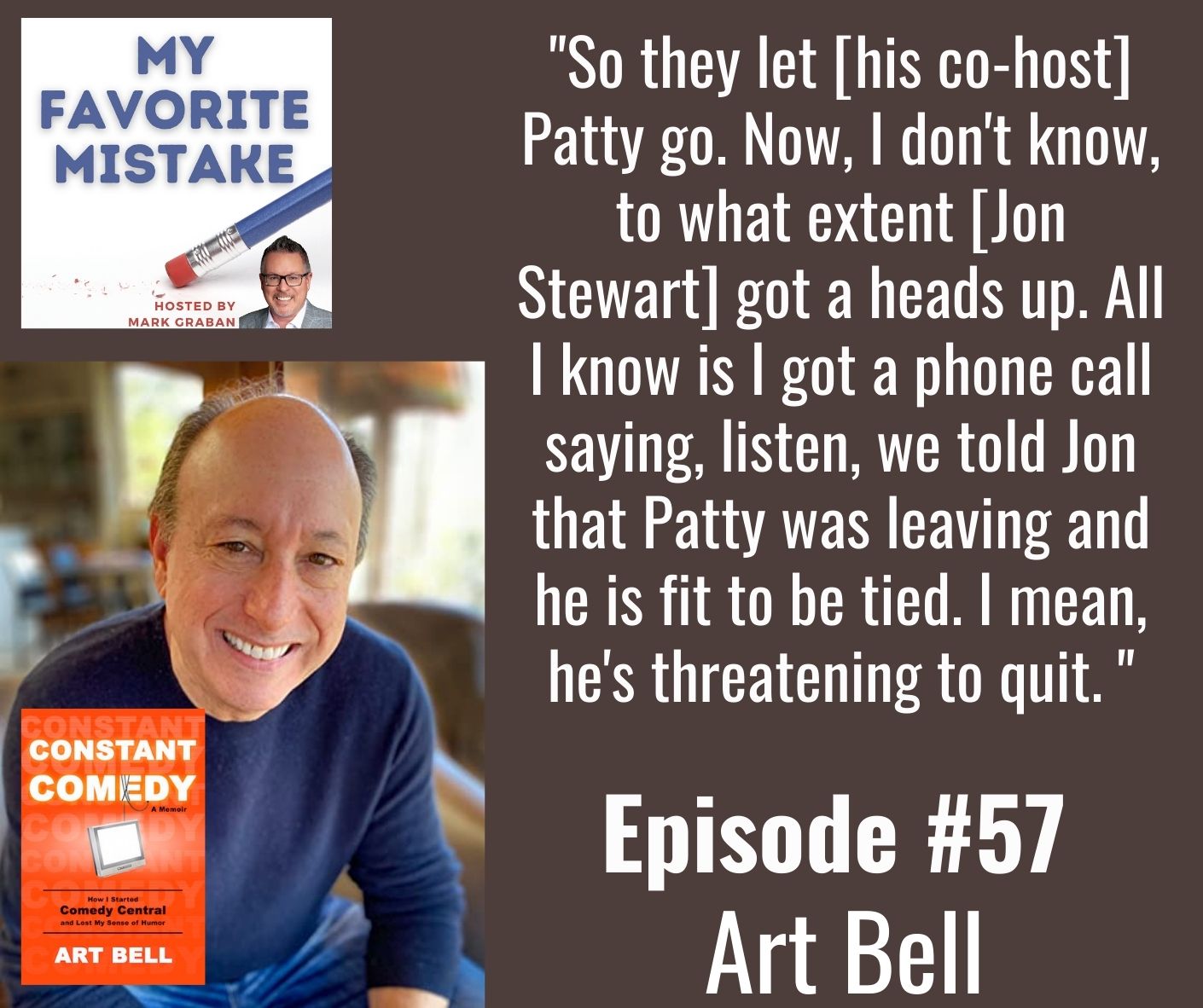
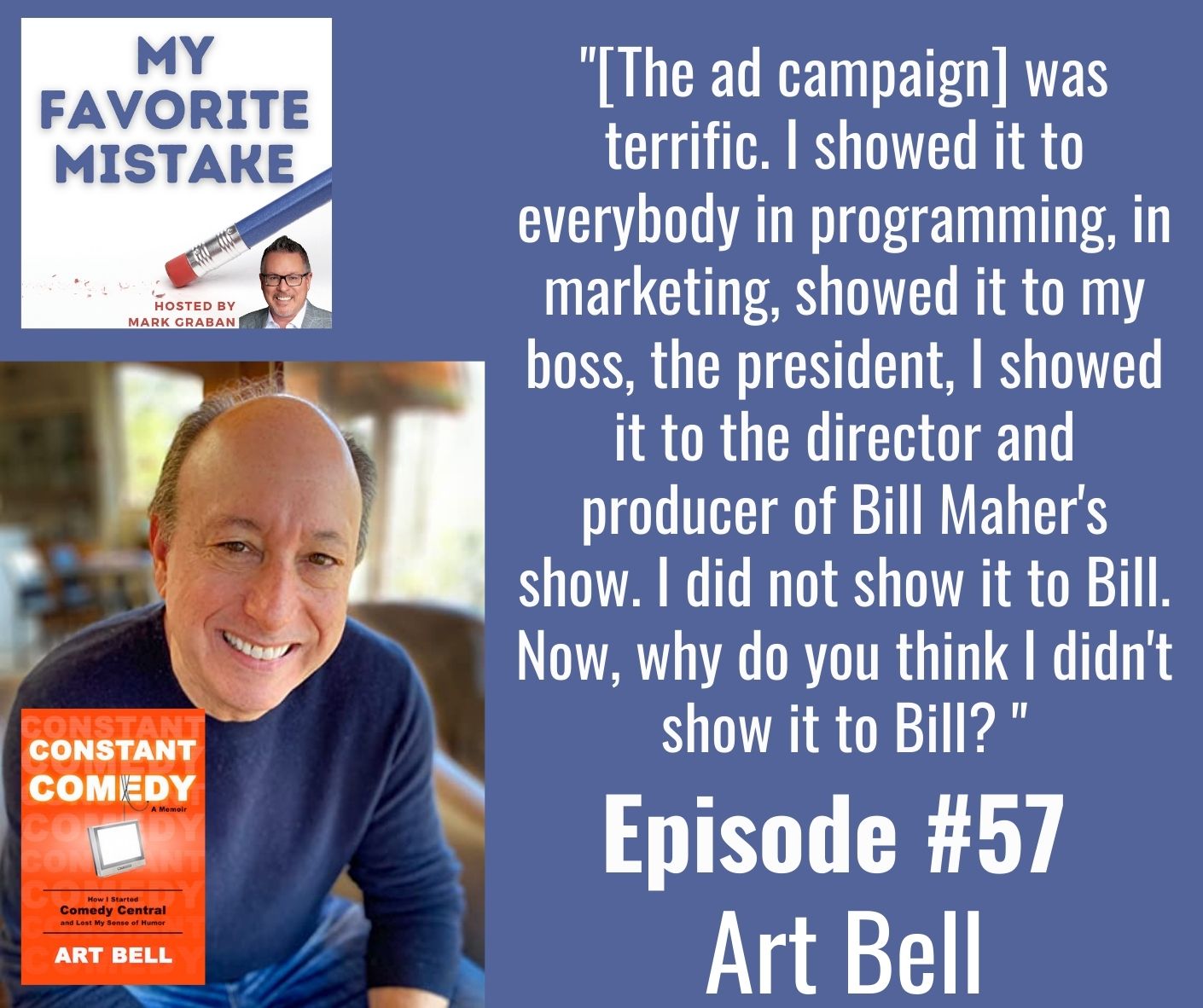
Subscribe, Follow, Support, Rate, and Review!
Please subscribe, rate, and review the podcast — that helps others find this content and you'll be sure to get future episodes as they are released weekly. You can also become a financial supporter of the show through Anchor.fm.

Other Ways to Subscribe — Apps & Email
When Bill Maher Wanted Me Fired From Comedy Central: Art Bell
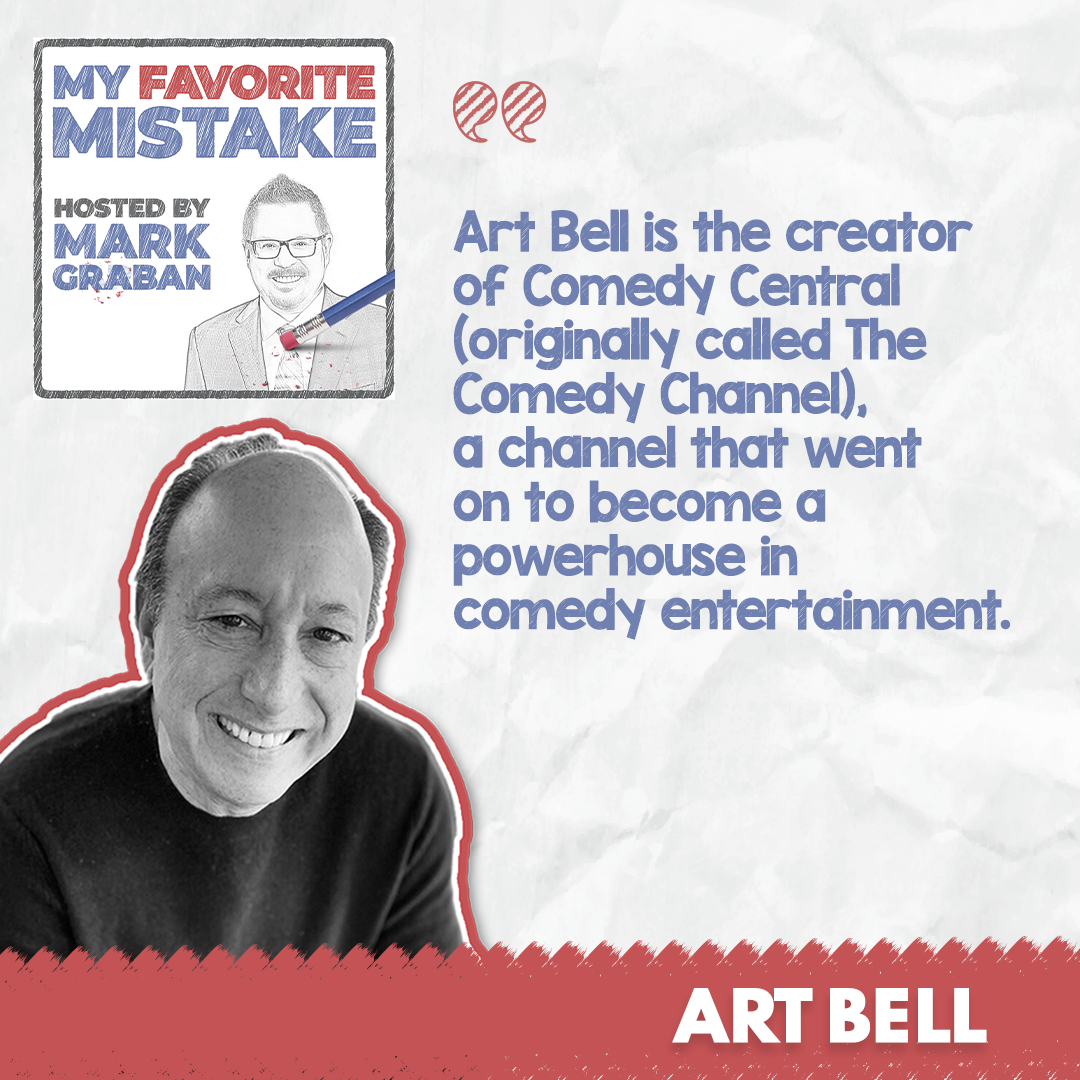
Our guest is Art Bell. He's the author of a memoir. It's available now. You can buy and read it like I did. It's called Constant Comedy: How I Started Comedy Central and Lost My Sense of Humor. As the title implies, Art had the idea for The Comedy Channel which was launched by HBO and Time Warner, where he worked. We're going to hear some stories from that in this episode. Art, thank you so much for joining us. How are you?
I'm good. Thanks for having me.
There are many interesting stories from your history and involvement with Comedy Central, precursors, and everything. Thinking back to your career and all the things you've done, what would you say is your favorite mistake?
My favorite mistake happened around 1992 at Comedy Central. A few months before, we had met with Bill Maher. He pitched us a show called Politically Incorrect. He wanted to make that talk show where people actually talk. That's what he said. We were very excited about it. We launched the show and got off to a pretty good start. I was responsible for marketing at that point. I decided I was going to market Bill's show because I thought it was a great show and a great representation of the channel.
I did a campaign with our new advertising agency, Korey Kay, and it was terrific. I showed it to everybody in programming and marketing. I showed it to my boss who was the president. I showed it to the director and producer of Bill Maher Show. I did not show it to Bill Maher. Why do you think I didn't show it to Bill Maher? Because he would have said, “I hate it. Don't run it.” We would have been up against the wall. I knew Bill well enough by then. He was a great television host, but he was sometimes very difficult to deal with, and I didn't want to risk it.
[bctt tweet=”The ad campaign was terrific. I showed it to everybody in programming and marketing. I showed it to my boss, the president. I showed it to the director and producer of Bill Maher’s show. I did not show it to Bill. Now, why do you think I didn’t show it to Bill?” via=”no”]
Thinking back to the old Life Cereal commercial, did you fear he would have hated anything or doesn't like anything?
I'm not sure what I thought. I was just erring on the side of caution because many people had put so much work into this campaign. It was an outdoor campaign. It was going to show up on bus sides, phone kiosks, and billboards in a number of cities across America. There's a big gamble on my part. It's not like I could have him say, “I don't like it. Do it over,” and then start from scratch. At that point, you're showing Bill Maher, “Do you like this? Do you like that? Do you like the other thing?” He's then in charge of marketing, and I didn't want that. I went ahead with the campaign because everybody said, “It's great. We like it.” It went up all over New York City. A day later, my assistant said, “Bill Maher is on the phone.” That was fairly unusual. It’s not crazy unusual, but Bill didn't call me for very many things at that point.
You were the head of programming.
I had been the head of programming. I was now the head of marketing. I took the call, “How are you doing?” He said, “I saw that outdoor campaign you did for my show. I hate it. It's terrible. If I did my job badly, you would cancel my show. I'd be fired.” I said, “Yeah.” He said, “I think you're doing your job very badly. I think you should be fired.” He cut me off and said, “I've made several phone calls. I am having you fired,” and he hung up.
[bctt tweet=”Bill Maher said, “I’ve made several phone calls. I am having you fired.” And he hung up. You can see how I consider that a mistake.” via=”no”]
I considered that a mistake. As a matter of fact, almost immediately after I hung up, I got a call from someone at HBO who was not that involved with the show but knew Bill and everything else. She had heard from Bill. She said, “You should have shown Bill that campaign.” She was in charge of talent at HBO so she knew what she was talking about. I said, “I probably made a mistake. He's going to get me fired.” She said, “Really?” I said, “Yeah. Would you get me fired if it was you?” “She said, “No, I would never get you fired.”
I told my boss, the president, what happened because he was the only one who could fire me, except for the board. He said, “Bill did call me but I am not going to fire you. I told him I liked the campaign and you're not going to be fired.” That is the story of a mistake. I can tell you a story of why it's my favorite mistake. A few months later, the campaign had run. We've gotten some press on it too and some attention for it. Believe me, when you run a marketing campaign, the best thing you can get is press because that's free advertising of your advertising.
We thought we were doing pretty well with it. I got a call from Allen Kay, who's the head of our agency. He said, “Good news. We got nominated for an award.” I said, “You're kidding. For what?” He goes, “For Bill Maher’s advertising campaign.” I said, “Now, I'm going to have to deal with that all over again.” He said, “Don't worry. It's an awards dinner. It's going to be fun. All the ad guys from all over New York are there. It's a very prestigious award.” I said, “Fine.”
A few weeks later, we're getting into the car and Allen says, “You're never going to guess who's hosting the award show.” I said, “I don't know. Who's hosting the award show?” He says, “Bill Maher.” I said, “You are kidding me.” If I wrote this in a novel, people would say, “That's ridiculous.” We're going to the awards ceremony. Bill Maher is hosting and I'm sitting in the audience. It comes to the point where he's announcing the award for Best Outdoor Campaign. He says, “The nominees are,” and takes a look. He gets to the 2nd or 3rd nominee, and it's Comedy Central.
They're projecting the awards behind him. He takes a look at the campaign that's being projected. He says, “That's great advertising,” and I just rolled my eyes. He reads the thing, “The envelope, please.” We won the Gold Award for Best Outdoor Advertising Campaign in New York that year. I couldn't stop laughing to myself. At the end of the night, we're high-fiving, sitting around, and talking about everything. Bill Maher walks by our table and I said, “Hey, Bill.” He didn't say anything. He just walked by. That's why it's my favorite mistake.
I believe you, but it's an unbelievable story. Many of the favorite mistake stories in this series are of the category of, “Here's a mistake. I wouldn't want to repeat that. I learned from it.” This is in the category of a “mistake” that turned into something very positive. Do you still have the trophy or the award there in your office?
I do, but I don't know exactly where it is. It's one I cherish for a long time. You mentioned the fact that we learned from our mistakes. It's a little bit of a head-scratcher to figure out what I learned from that mistake. If you ask me, would I do it over again exactly the same way? I'm not sure I wouldn't say yes because I was concerned that he would shut down the campaign. On the other hand, let's have a conversation. What would have been the right way to do it?
You brought up the one thing that occurred to me. Once the campaign had been developed, you didn't want to run it past him because then he could shoot it down. Bringing him in early on and running a couple of concepts by him, as you said, Bill Maher was running Comedy Central marketing. That's tough. Maybe that is a situation where you need to just roll with the punches. Did you have future ad campaigns for Politically Incorrect? Do you go to the boss and say, “Bill Maher might be upset about this? Do you have my back?” Maybe you need to cover your bases that way.
I figured my boss had my back anyway because that's what your boss is supposed to do. What I learned is you have to make sure that the first time the talent sees a campaign for his or her show, it is not when it's being shown, exhibited, or run on the radio or television. It's like anything else. It has no context. You can't answer the question, “Why this campaign and not something else? Why did you use that picture and not another one? What do you hope to achieve by the campaign?” It’s all those things.
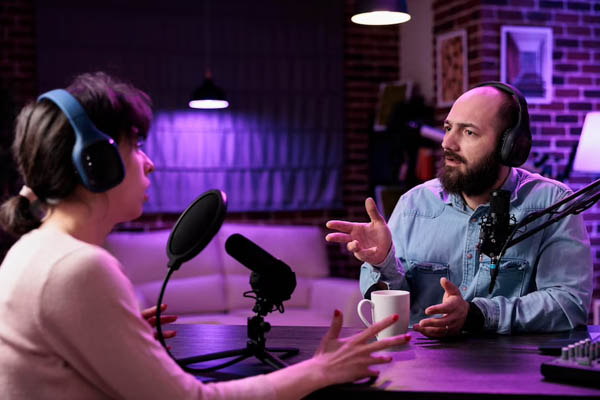
I was new to marketing and I did not know much about marketing. I was learning on the job even though I was a fairly seasoned executive at that point. Since then and throughout my career from that point in television, I made sure that I gave what I called a heads-up look to the talent. I usually started by going to either the producer of the show or somebody close to them, possibly the head of the programming department, and said, “We got to get this in front of so and so. How do you want to do it?”
I was going to ask about one other groundbreaking program that Comedy Central did. It was the live commentary of the State of the Union: Undressed. Al Franken did that the first year, and then Dennis Miller. Did you follow that approach of sharing any of the advertising with them, or was that different because this was more of a one-off special?
It was a little different because it was a one-off special. On top of that, it was not personal to the host. It wasn't like Al Franken is presenting the State of the Union: Undressed for Comedy Central with a picture of Al and or something like that. Al Franken was a feature of the broadcast that year, but Al Franken was not the focus of the campaign. The focus of the campaign the first year, as audacious as we were, was to comment live during the State of the Union Address on what the President was saying. That was the focus. I was always worried about what the talent was going to say about anything that we were doing that wasn't what the talent was doing on the talent show or anything that could set some of these people off. It was quite something.
I thought this was a funny story from the book with Al Franken. He did stomp off the set a couple of hours before that first State of the Union: Undressed because he apparently didn't realize it was going to be live.
That is the story. We had hired Al Franken. We were all excited about it. Al Franken at the time was a pretty big deal because he was writing and performing on Saturday Night Live, which is live. It's not like he had no concept of what working live was all about. We brought him in, and the director of the show, a guy named Billy Kimball who was also on the show, was terrific. He rehearsed for a week and everybody knew what they were doing. It was more planned than just going out there and throwing yourself at it.
It wasn't hours. It was more like one hour before the show. They had finished rehearsing. Billy announced, “Everybody, take half an hour, relax, and get yourself ready. We are going live in one hour.” Al looked over and said, “We are going live? We're doing this live. I thought this was going to be live to tape. I didn't know this was going to be live. I'm not doing this live. I'm going to go call my agent right now.” He stormed down.
[bctt tweet=”We are going live in one hour. Al Franken said, “Wait a second, we’re doing this live? I thought this was going to be live-to-tape. I didn’t know this was going to be live. I’m not doing this live.”” via=”no”]
We spent about ten seconds looking at each other saying, “Where's Plan B?” Was there a mistake? If it was a mistake, it wasn't my mistake at that point. We had a vice president of talent and development. Her name was Laurie Zaks. She was as buttoned up an executive as I've ever seen in the entertainment industry. She's very successful today. She produced a lot of shows. She ended up running after him. She went out the door and we all wondered what she was going to say to him, and whether it was going to work. Five minutes later, Al Franken walked back in and said, “We're good,” and that was it.
Was Dennis Miller a better fit for that sort of ad-lib show that was live that way?
He certainly acknowledged the fact that he was going to be ad-libbing as he went into it, but like most comedians and standup comedians, Dennis's act was written. He knew what he was going to say most of the time in his act. We required Al, Dennis, and the other people who did this to improvise. Some people are great at it and some people are terrible at it. Bob Hope famously said, “You wouldn't say that if my writers were here.” Al did a fantastic job. Whether he had faith in his ability or not, he did a beautiful job of reacting to what was going on, and so did Dennis. It wasn't that Al was not capable of doing it. He probably even knew in his head that he could probably pull it off. He was just surprised. Once again, do not surprise the talent.
There's that expression of, “It's impossible to over-communicate, and make sure that we're on the same page.” I think it is a lesson that applies in a lot of corporate settings.
Yes, although I will make a distinction. That's the common example of, “What do you tell when there's a bad piece of information?” The answer by everyone's standards is you tell bad news as early as possible to the people for whom it's going to make a difference, especially your boss. If your boss gets mad, your boss gets mad. What you don't want is your boss to stumble on the information. Here's the difference. Talent is not your boss. Talent as it was explained to me early in my television career is the guys who get out on stage in front of the camera with the lights on them, putting themselves on the line in a performance.

It doesn't matter all the people that are behind them, the writers, producers, me, and everybody else. We're not there anymore. Now it's them and it's up to them to make it work. When they get cranky and they say, “I want a blue M&M’s in my dressing room,” you say, “We'll get you blue M&M’s.” That can go too far as you can imagine. Talent does take advantage. I worked with Nancy Grace, who was on Court TV when I was running Court TV. I would have to talk her into going on the air. She had a five-day-a-week show at 5:00. I would have to talk her into going on the air lots. It seemed like 3 out of 5 five days. I'm not sure it was that much.
I would get a call from the booth, “Nancy is upset about something. She doesn't like the wardrobe. She's refusing to go on and we got ten minutes to air.” Talent is sometimes very difficult to handle. That's why we had at Comedy Central and most places a vice president of talent because the people who are good at this are brilliant at it. Laurie Zak says that she has become known in Hollywood as The Talent Whisperer, which cracked me up. I even say in my book, “She was spectacular at it. I don't know how she pulled it off,” but I would not have been spectacular at it.
I'm sure some people have a knack for it, or maybe they have a background in psychology. Is it risky to write a memoir? There are some very detailed retellings of meetings and things that were happening at HBO, through the Comedy Channel, and the evolution of Comedy Central. Do you have to get lawyers involved to make sure that you're not saying the wrong thing or making a mistake in writing it?
You can get lawyers involved. I did check with some lawyers about whether I should get lawyers involved. As it turns out, memoir writing comes with a certain degree of risk, partly because a memoir is not an autobiography or a history. A memoir is based on your memory. In this case, my memory of what happened. There's a lot of dialogue in this book. I remembered specific lines from specific meetings, and usually the important people were there.
I was recreating dialogue based on my recollection of a few important lines. That's not the problem. The problem is when people think they've been libeled. Libel is a very specific law in the US and it's pretty easy-going on guys like me. Libel requires you to not only say something nasty about the person, but you have to say something nasty knowing it's not true, and with the intention of slamming the person and having the person not be able to get work again in that person's field.
That's a pretty high bar all in. I started looking at researching it. I found that there are very few lawsuits against memoirists. There are very few challenges to memoirists. This stuff happened 30 years ago. It's Comedy Central's 30th anniversary on April 1st. It's incredible. Most of the people were treated pretty nicely, but I will say this, all of the people were treated fairly. There's a saying among memoirists, “If you don't want me to depict you badly in your memoir, then don't be a jerk in real life.” That applies. I did not go out of my way to make someone look bad. I did describe the situation. If your conclusion is, “That person was a jerk,” there you have it.
[bctt tweet=”There’s a saying among memoirists: “If you don’t want me to depict you badly in my memoir, then don’t be a jerk in real life.”” via=”no”]
Somebody who comes across very well in the book when it comes to telling stories about talent is Jon Stewart. As much as I loved his work on The Daily Show when he started in ‘99, I didn't know because I didn't have cable television until 1995. I didn't even know of the show Short Attention Span Theater that he was a co-host of. I was wondering if you could tell the story from the book. There was something that might have been you reflecting if that was a mistake to make a decision about that show that surprised him.
That was another case where the talent was surprised. I don't even know the extent to which he was surprised. I heard that from him. The setup is Jon Stewart was hosting Short Attention Span Theater with a co-host named Patty Rosborough, another comedian. They had been on the air for a few months. Mind you, this was Jon's first job in television. It was not quite his first job, but he was a baby comic. He didn't have a whole lot of experience.
As soon as I saw him on television, I knew he was great. You're watching the Talent on Comedy Channel at that point, trying to figure out who's good and who's not great. He immediately connected. It wasn't that Patty was bad, but Jon was doing much of the talking. She was just doing much of laughing that she became the audience. I thought that was a good thing because when you and I laugh on the show, the people listening or watching will laugh too.
I wasn't in charge of that show. People said, “I think Jon would do better by himself.” They let Patty go. I don't know to what extent he got a heads-up. All I know is I got a phone call saying, “We told Jon that Patty was leaving and he is fit to retire. He's threatening to quit. He's upset. You got to come down here and talk them off the ledge.” I'm not so great at this. That's why I'm not a talent person, nor was I ever. I said, “I'll come down and talk to Jon.” I walked in and said, “We thought it was important, given that you were doing so well. We thought the show and the channel would benefit and it was best for everyone. Patty is going to be fine.” He said, “You can't do that. You cannot fire someone like that.” At this point, I almost wanted to laugh because we were in a corporation. This is a business. It’s the whole idea of, “You can't fire someone like that.”
[bctt tweet=”They let Patty go. I don’t know to what extent John Stewart got a heads-up. All I know is that I got a phone call saying, “Listen, we told John that Patty was leaving, and he is fit to be tied. I mean, he’s threatening to quit.”” via=”no”]
Maybe that's his inexperience.
It was more than that. It was his empathy. He cared about Patty. It's not like they were pals from way back or anything, but she was his co-host and they got along. He was looking out for her. He felt that we had crossed a line by letting her go, especially without consulting with him about whether we should let her go. That was a moment. At that point, I realized that not only was Jon great on television, smart and funny, but he had a lot of empathy. He was principled and was willing to take a stand for his principles. All of that showed up on the Daily Show. No surprise to me after that. I got to know Jon after that. He was a terrific guy, easy to work with for the most part, and fun to hang out with.
He comes across very favorably in that story because as you pointed out in the book, a lot of people would kill to now have a solo show. I feel bad for Patty. For him to react that way, shows a certain character that comes through very strongly. I admire him for that.
I'll give you one better. A lot of people who co-host are constantly whispering into the producer's ear, “I could do this on my own. I don't need that person schlepping along,” but that was not Jon.
At that point, you were still head of programming. Later on, you were fired as you talk about in the book, and maybe we can come back to that.
That’s briefly my eight years at Comedy Central.
I know that Jon Stewart had left. He was doing a show on MTV. You might be speculating because this wasn't your decision and you might not have even been around it. In hindsight, it was a mistake to not hire him to be the original host. I remember watching Craig Kilborn and he was fine, but Jon Stewart took that to a whole new level three years later when he was hired.
I was around when The Daily Show was being produced. I was not producing it. The producers were not happy with Craig. He wasn't putting it over the top according to them. I'm not even going to comment. I just don't remember what was going on with his performance. For all we know, something else was going on on the set that they didn't like. They got Jon Stewart back from MTV. Sometimes in television and movies, because it's a collaborative effort, magic happens. This was one of those cases. You had the right producer, the right format, and the right host. All became spectacular.

Not even getting into the story of you being fired, but there was a story you told in the book. This might have been Comedy Channel days still, where one of the executives, Michael Fuchs was asked about the programming quality on a scale of 1 to 10. He said, “It was a 2 or a 3.” You said you were quitting. Can you tell the story about rethinking that? Was that a mistake that you were able to walk back?
There was an instance around that time that I threaten to quit. It wasn't in front of Michael Fuchs. Michael Fuchs was the most powerful man in Hollywood at the time. He was proclaimed the most powerful man in Hollywood by New York Times Magazine. They had a cover story on him. If I was in Michael's office, I would not have quit. You do what you're told when you're in Michael's office. You don't grandstand or argue, none of that. I was talking to somebody else who was the president of Comedy Channel at that time.
Remember, I was a very junior person when I started this whole thing. I didn't know anything about programming. The fact that they gave me a job on this channel that I recommended that they start and showed them how to start, I was enthusiastic. When we got into it, I realized that everybody had to be focused on making sure that it survived. Survival was the issue. Don't misunderstand. I went to work every day wondering if they were going to pull the plug on the Comedy Channel because that's how much incoming bad press we were getting. That's how much anxiety was going on the part of Michael Fuchs and the other people at HBO who had taken a risk with this thing.
My boss at the time was the president of the Comedy Channel, and he was having a moment of crisis. It was after work. He was hanging his head and said, “Do you think this thing can make it? Everything is going wrong. I don't know if this person knows what they're doing. I don't know if that person knows what they're doing.” That made me incredibly mad. I snapped. I don't usually raise my voice. If you can tell from my demeanor, I'm pretty calm. You have to be pretty calm in that business.
I snapped because I said, “If this is the way you feel, then maybe I'm working for the wrong channel because this is not about wondering whether we're going to be successful. This is about making sure that we're going to be successful up until the moment when someone says, ‘We're shutting you down,’ and they haven't done that. Until then, we have to project to the 400 people who are now working on this baby confidence. We have to keep figuring out how to make it better.” I stood up and started to walk out. He called me back and calmed me down. He said, “I'm sorry. You're right.” I did not quit.

Comedy Central, 30 years later, has been such a phenomenon in different ways. They are bringing South Park to a mass audience which I'm forever appreciative of. I'm a huge fan of that. The early days of the Comedy Channel seem like many startups. There's a great idea. You announce it, and then two days later, Viacom announces a competing channel. Did they have that in the works or was that purely reactive? It’s like, “We've got to get out in front and we'll figure it out.”
They announced it in a press release a day or two after our announcement. We had been working on it for 4 to 6 months at that point. I think they hadn't been working on it. They launched six months after us. You're seeing that it's a six-month all hands on deck. You can get the thing up in six months. They would've launched right against us if they could. I have since talked to people on their channel, which was called Ha! The Comedy Network. They didn't quite cop to it. They said, “We came up at a meeting a few weeks earlier by chance. Maybe we should do some comedy stuff,” but they were not doing it. What they were doing was Nick At Nite, which was old sitcoms. That was their headstart on that.
As you talk about in the book, there are the startup challenges of getting up and running, and then you've got the concept, and then you're testing that in the marketplace. It seems like the original concept in a way was MTV for comedy. You would show clips that were the equivalent of music videos. You would have a VJ. People in startup circles now would say that there was a pivot or some adjustments in the programming.
The smart thing was we pivoted. We didn't call it pivoting at that point, but we made changes as quickly as we could. One of the reasons that that strategy didn't work was because we had to get the permission of the unions to use the clips, and we did. We got it in writing. However, a few weeks before we launched, we got a call from the Director's Guild saying, “We changed our mind.” Somebody on the board said, “I don't like this. We are withdrawing our support.”
Suddenly, the pile of comedy clips that we had created, we could no longer use. Who knows? Short-form comedy is not an untried concept. If you look at YouTube now, that's how kids and people absorb this stuff. In those days, there wasn't an outlet for it so much. People always talked about their favorite scenes and their favorite moments. We cultivated that, but then it didn't work for those reasons and maybe others. We never got a chance to explore whether it would've worked. If we were going to survive as a comedy network, we had to figure out what that network was going to look like.
That’s a very general business challenge of, “Do we stick with it and give it more time, or do we pivot?” That's a judgment call and you do your best. I'm glad the Comedy Channel figured it out so it could survive and evolve into Comedy Central as it merged with Ha! The Comedy Network.
The two channels were merged at the end of a year after we launched. That was a disappointment to me. I thought we had the better concept. We had certainly built an audience by then. We had a mix of clips, standup comedy, and some movies. We had Mystery Science Theater 3000 on the air. We had some sketch comedy, Kids In The Hall. We were developing some shows. We were off to the races from my point of view, but it was a fight for distribution and advertising. The heads of Viacom and Time Warner were not happy spending money on this endless fight because nobody was going to say, “Uncle,” so they decided to merge us.
Our guest is Art Bell, not to be confused with the Late Night Overnight radio talk show host, Art Bell.
I hope not because he's no longer with us.
I had a guest previously who was Stephen King, but not that Stephen King.
I was in the media business in television. He was on the radio. I would go to a media conference of any sort and they would say, “Art Bell,” when I'm checking into the hotel because nobody knew what he looked like and nobody knew who I was. It happened quite a bit when I was out and about, but never to my detriment. It wasn't confusion that caused some horrifying story of some sort.
Maybe a final question for you. People can read all of these stories about the idea, the launch, and the merger. There's a lot of great stuff in the book. I hope people will check it out. There was one reflection that you shared in the book after you retold your story of being fired. I forget if you used the word mistake, but you came to understand when people were fired to look at those folks differently. In the past, you had made an assumption that if somebody got fired, they in some way sort of deserved it.
I spent a lot of time hiring people and occasionally firing people, but my understanding of people who got fired was that they did something horribly wrong, didn't show up for work, or messed up. Suddenly, I was fired not for messing up, but for having been completely involved in the launch and the formation and direction of the Comedy Network, the Comedy Channel, and then Comedy Central. When they brought in new management because they fired my boss, the president, the new management fired everybody.
When he fired me, he said, “You got your fingerprints all over this network. I can't keep you here because I got to go my own way.” That was a lesson for me. It didn't make it sting any less, I have to say. From that point on, when I was considering hiring somebody, if they had been fired, I'd say, “They're still worth considering. They're not a complete screw-up of some sort.” That was a big lesson for me.
Thank you for sharing that lesson in the book and others here. You can find the book on Amazon and other resellers and retailers. His website, if you want to go check it out, is ArtBellWriter.com. There are a lot of other great stories in the book, and writing about things he did after Comedy Central, the early days of comedy on the internet, and then going to Court TV. I enjoyed reading that. Even though I didn't have a chance to watch Comedy Central in the early days, it's interesting to go back and know more about how it came to be, and what those early days were.
Thank you. Speaking of that, I just want to mention one more thing. Since April 1st is the 30th anniversary of Comedy Central, a friend of mine, Vinnie Favale, and I are doing a series of twelve podcasts where we are interviewing people from the early days of comedy who have since gone on to brilliant careers in the entertainment business. We are launching that on April 1st. It's a fun podcast. I encourage everybody to check it out if they want to hear some stories from the real people who lived it.
I will check that.
Thank you very much.
Our guest has been Art Bell. His book is Constant Comedy: How I Started Comedy Central and Lost My Sense of Humor. I didn't get a chance to ask you about that part of the subtitle.
It was something that Michael Fuchs said three months into it. He said, “It took a comedy channel to make me lose my sense of humor.” I had momentarily lost mine when he said that.
I'm glad you found it again. I'm glad you've got it back. As you said in the book, “The comedians would've just sat there and said, ‘That's funny.‘” I'm laughing, which shows I'm not a comedian.
No laughter involve. That's funny or that's not funny.
Art, Thank you. I've enjoyed this. This has been fun and interesting. I appreciate it. Thanks again for being a guest.
Thank you for having me.
—
Thank you, Art Bell, for being such a fantastic guest. Don't forget, if you want to enter to win a signed copy of Art's book, Constant Comedy, you can go to MarkGraban.com/Mistake57. Coming up on the next episode is the legendary management consultant, speaker, and author Tom Peters. You'll know about his favorite mistake, some surprisingly long hair that he had at one point, and more. I hope this show inspires you to reflect on your own mistakes, and how you can learn from them, or turn them into a positive. I've had people tell me they've started being more open and honest about mistakes in their work, and they're trying to create a workplace culture where it's safe to speak up about problems because that leads to more improvement and better business results. If you have feedback or a story to share, you can email me at MyFavoriteMistakePodcast@Gmail.com.
Important Links
- Constant Comedy: How I Started Comedy Central and Lost My Sense of Humor
- ArtBellWriter.com
- MarkGraban.com/Mistake57
- MyFavoriteMistakePodcast@Gmail.com
- State of the Union: Undressed
- Short Attention Span Theater
- Patty Rosborough
- Constant Comedy – Apple Podcasts

